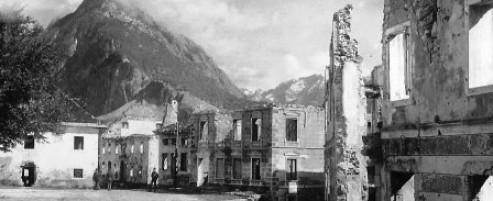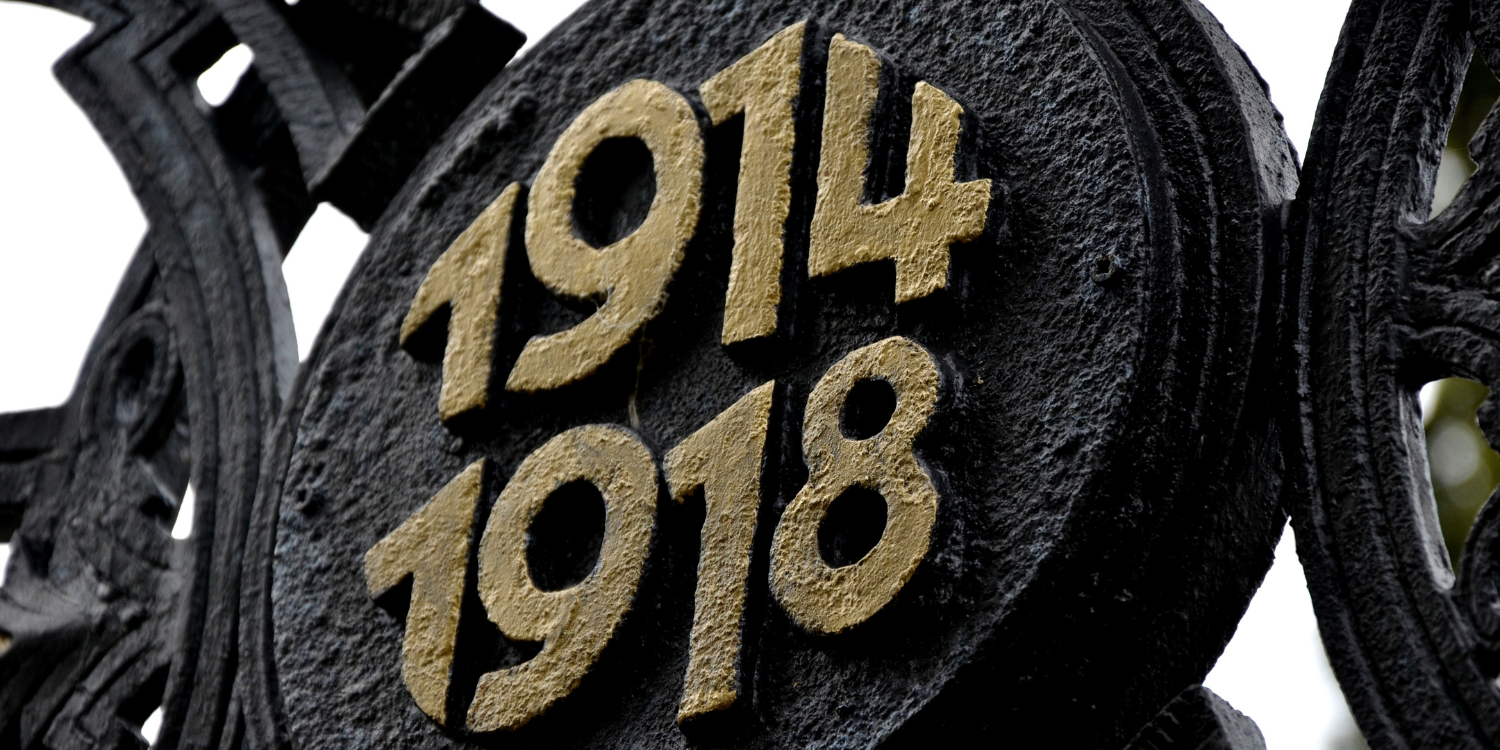
13 Feb 1st World War – Reasons for the Clash
First World War is one of the most disturbing chapters of the Soča River valley history book. We mark 100 years since the assassination of Austro-Hungarian archduke Franz Ferdinand in Sarajevo. The assassination which happened in a town more than 700 km away from Bovec, pulled the whole of Europe in a dreadful war. High mountain battles of the Isonzo front forever marked our region.
ARCHDUKE FRANZ FERDINAND
Historians agree that the assassination of archduke Franz Ferdinand was not the reason for the outbreak of the World War 1. It was an excuse. Of course, the Austrian Emperor Franz Joseph was personally hurt when he learned that the crown prince is dead. But the relationship between Franz Joseph and Franz Ferdinand was not warm at all.
Uncle and nephew disagreed about virtually everything. Old emperor was not very happy with the idea that this arrogant, snobbish man will take over the leadership of the empire after his death. One of the biggest disputes between the two was the marriage of Franz Ferdinand with irrelevant Czech Countess Sophie Chotek.
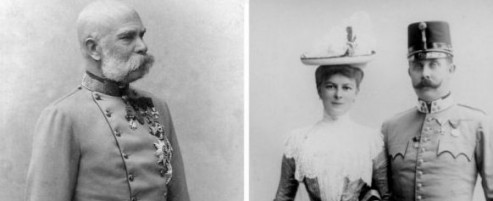
In fact, the Habsburg court in Vienna was a pretty miserable place where drama and tragedy happened quite often. The Habsburgs were the family that shaped the destiny of Europe for 650 years. From a modest noble family they turned into the world dynasty with clever marriages. And, you did not just shoot a heir of such dynasty without severe sanctions. Right?
A few years earlier the Viennese court donned in black after the beloved wife of Emperor Franz Joseph, Elizabeth, better known as Sisi, was killed in Switzerland. Very beautiful and popular Empress was stabbed in the heart with a file by the Italian anarchist in Geneva. Franz Joseph was broken because he deeply loved his wife. Yet, the emperor did not send ultimatum or announced the war on Switzerland nor Italy.
Why did he then declare war on Serbia after the assassination of his unpopular nephew? Despite the fact that the official investigation could not prove involvement of the Serbian government in the assassination.
There are quite few real causes for the outbreak of the Great War and they are highly intertwined.
ALLIANCES
At the turn of the 20th century, Europe found itself in the twilight zone. Old Empires lived at the expense of distant colonies. Distant lands with their natural resources provided the comfort and luxury for European courts. But all this splendor was built on fragile alliances, where the political appetites were changing rapidly, and no one was to be trusted.
In fact, it all started at least 100 years earlier. With the defeat and exile of Napoleon. European diplomacy was shocked over how a general from a modest family from Corsica was able to achieve such power in such a short time. Napoleon managed to gather a mighty army, which endangered practically all European countries for 15 years.
And, when the great monarchs finally took the affairs back into their own hands, they decided that such a thing should not happen again. At the Congress of Vienna, which took place from September 1814 to May 1815, they started a dialogue on mutual alliances. The logic behind the alliances was very simple. It is less likely that you will declare war to a country, if you know that your opponent has powerful friends to protect him. This way, diplomacy achieved a peace that lasted for another 100 years.
But at the end of the 19th century two new players who were not present at the Congress of Vienna, entered this political game. Italy and Germany were previously fragmented into many small kingdoms and republics. Then, this kingdoms merged into two new countries. Germany and Italy required international recognition in the political arena. They also got involved in the game of concluding alliances, not hiding their appetites after the territory of neighboring countries and colonies.
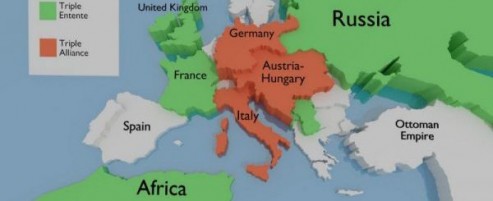
ARMS RACE
Natural resources of the overseas colonies provided an economic boom of some European countries. There was enough money for amazing technological advance. In the military field too. Large armies in a nice tailored uniforms with the latest weapons became a matter of prestige and territorial expansion or economic influence.
Countries began to compete among themselves for bigger and better-equipped army. Arms race was especially prominent between Germany and Great Britain. Germany, felt quite uncomfortable due to its geographical position between France and Russia. Therefore, Germany did everything possible to create the strongest and the best land army of that time.

COLONIALISM
Germany and Italy entered the colonialism scene quite late. All the richest colonies were already part of other empires. Most of the distant lands of immense natural resources were part of the British empire in which the sun literally never set. Germany was very aggressive at demanding colonies and Great Britain was actually quite tolerant at first.
However, if Germany wanted to build an empire, it needed colonies. To conquer new colonies it needed a strong navy. That’s why Germany soon adopted a law outlining the megalomaniac program to build warships. In response United Kingdom also began to expand its already strong navy. Consequently, the mistrust and hatred increased between both nations.
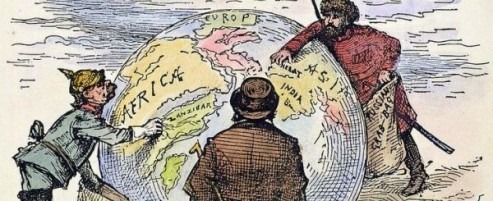
IMPERIALISM
Great empires were also trying to expand their powers and influences over the smaller nations on the map of Europe by imposing territorial claims or by creating economic and political control.
Austria-Hungary doesn’t have a navy strong enough to conquer new colonies. Therefore, it has to extend it’s empire on land. And, the only direction possible to spread was the Balkans.
After the annexation of Bosnia and Herzegovina, it was only a matter of time before Serbia and Montenegro were occupied as well. Kingdom of Serbia succeeded in maintaining independence, but was basically just a satellite of Austria. Serbia made most of the money by exporting to Austria. When Serbia decided to get rid of this economic and political dependence, it started to export its goods to France. Of course Austria harshly reacted and completely closed its borders to Serbian goods.
NATIONALISM
Such incidents made the Habsburg Monarchy very unpopular. All Slavic nations started demanding independence and unification in the Kingdom of the South Slavs. Austria-Hungarian empire at that time was a mixture of many nations, languages and cultures. And, most of the smaller nations were not really thrilled about the fact that the big ones were deciding on their fate. This so-called Pan-Slav movement had a strong support of the largest superpower in the world – Russia. Which made Austria quite nervous.
So encouraged, the south Slavic nations start to impose requests for greater autonomy. But Vienna ignored their claims.
For these reasons, life was quite tense, outside the magnificent dance halls where sweet Viennese Waltz was playing. Great conflict was just waiting for a spark to start a fire.
ASSASINATION IN SARAJEVO
And then it happened. On 28th June, 1914, Franz Ferdinand and his wife visited Sarajevo. Diplomats were trying to warn him that the Balkans was boiling and the timing was not exactly the most convenient for visiting Bosnia. But, the crown prince ignored them.
Franz Ferdinand and his wife Sofia just celebrated 14th wedding anniversary. Marriage, which fulfilled their true love, but didn’t bring much happiness into their lives. Ferdinand and Sofia were hiding their love for 6 years. They both knew that Sofia, despite the noble title was far from being important enough for marriage to a royal family. When a scandal about their relationship broke out, Ferdinand stubbornly insisted that he will marry her or no other. The couple married, but he first had to publicly denounce inheritance rights for his wife and their children. None of them would be entitled to the throne in case of his death.
Franz Ferdinand and Sofia were happy in marriage. To a big surprise of the court the prince without charisma became a devoted and loving father to three children. But Vienna Royal protocol was extremely cruel to Sofia. Sofia couldn’t publicly appear in the company of her husband. During family feasts she wasn’t allowed to sit next to him, at palace processions she was walking far behind. Therefore, the couple decided that they will visit military maneuvers in Sarajevo on that fateful June day in 1914, despite warnings.
On this trip they had a chance to escape strict Viennese protocol for at least a few days. Sofia was acting as a future empress at her husband’s side. So, she was sitting besides him in an open car that drove on the streets of Sarajevo. In the crowd that loudly welcomed the imperial couple, stood a sickly young man full of hatred towards the monarchy. Only 19 years old, Gavrilo Princip seized the opportunity and launched the fatal shots. Franz Ferdinand and his wife were dead on the spot.
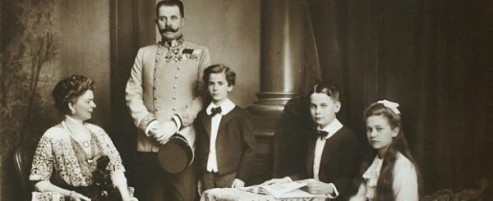
THE BEGINNING OF THE WAR
In Vienna, this event triggered a hostile reaction. Influential German Emperor convinced the Austrian one to send an ultimatum to problematic Serbia. Gavrilo Princip was a Serb, and was a member of the Black Hand terrorist movement that advocated the independence of South Slavic nations. It was, therefore, easy to accuse Serbian Government it played a part in assassination plot.
Serbia agreed to all the conditions of the ultimatum, except one. Thus, only a month after the assassination of the archduke, Austria-Hungary declared war on Serbia and the dominoes began to fall. To support Serbia, Russia declared war on Austria-Hungary and shortly after Germany declared war on Russia. It didn’t take long before the war spread to practically all European countries because of the hidden alliances. And, with the empires the colonies were also entering the war so it quickly became a world war.
Historians now agree that the war could easily be avoided. All European monarchs were cousins. How bad could it therefore be? But military commanders wished for a war. They taught the war would be over by Christmas. No one at the time could predict that they were about to experience four years of killings and the collapse of some large monarchies.
Less than a year after the outbreak of the war, Italy also entered the war. The fighting moved to our remote valley. The Isonzo Front opened and remains can still be seen in the Soča valley as well as in the mountains.
